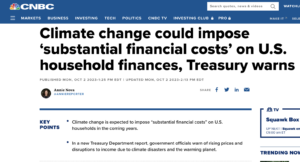By Annie Nova – CNBC
- Climate change is expected to impose “substantial financial costs” on U.S. households in the coming years.
- In a new Treasury Department report, government officials warn of rising prices and disruptions to income due to climate disasters and the warming planet.
Climate change is expected to impose “substantial financial costs” on U.S. households in the coming years, according to a new report by the U.S. Department of the Treasury.
Between 2018 and 2022, weather and climate disasters cost more than $617 billion, it found — a record. Within the last year, 13% of Americans reported economic hardship due to severe weather events and disasters.
“Severe flooding, wildfires and extreme heat are imposing significant financial burdens on households across the country,” Graham Steele, assistant secretary for financial institutions at the Treasury Department, said in a statement.
The government report flags the biggest financial risks from a warming planet. Here are some of them.
Pay and benefit disruptions
Flooding and wildfires can damage businesses, forcing employers to furlough or lay off staff, the Treasury Department found. This could lead workers to lose their pay for a period, and potentially their workplace benefits, including health insurance or retirement plan support.
Recurring hazards such as wildfires or heat waves could reduce the available jobs in certain sectors, leading to long periods of unemployment for people. Workers in the fields of agriculture, construction, manufacturing and tourism may be especially hard hit.
Meanwhile, “outdoor workers,” as the report describes those who spend more than two-thirds of their workday outside, comprise about a fifth of the civilian workforce and are among the most likely to see their hours and pay disrupted.
At times in the Treasury’s report, the financial threat is secondary to a more existential risk given the dire climate conditions anticipated.
For example, it warns that prolonged exposure to extreme heat may impair workers’ physical and cognitive abilities, “which can lower their overall productivity and, consequently, result in a decline in their earnings.”
Property destruction
Climate disasters impacted 1 in 10 houses in the U.S. in 2021, and led to damages exceeding $56 billion, according to one recent study by CoreLogic, a global property information firm.
Families unable to quickly pay for repairs in the wake of climate disasters may see their property values decline or vanish, the Treasury Department says. It points out that Hurricane Katrina damaged about 70% of all Louisiana properties. Nearly a fifth of those properties remained unrepaired five years later, and 8% were uninhabitable.
Many families could have to relocate due to climate change, incurring relocation expenses.
Higher prices for consumer products, energy
Climate change-caused disruptions to supply chains could lead to soaring prices on certain products, the Treasury Department finds.
Droughts, floods and extreme temperatures will likely create food shortages and make prices at the supermarket increase. Transportation of food and goods may also be hit by climate events, leading to more delays and shortages on store shelves.
“When climate hazards increase food prices, this may cause additional households to experience food insecurity,” the report says. “Food insecurity disproportionately impacts lower-income households, families led by single mothers, families with children, and households in Southern states.”
Households may see their energy bills rise too as climate change worsens. Heat waves, for example, will lead many families to use their air conditioners more frequently. Climate events can also lead to increased medical expenses. The Treasury report notes that in one analysis from 2012, 10 climate events led to a total of $10 billion in health-related costs.
Andrew Rumbach, a senior fellow at the Urban Institute, said he was glad to see the government focusing on climate change’s financial impacts on households. Usually that discussion is centered on societal expenses, he said.
But, “at the end of the day, it is individuals and families that will carry a lot of these costs,” he added.
#
CNBC: Climate change is expected to impose “substantial financial costs” on U.S. households in the coming years, according to a new report by the U.S. Department of the Treasury. …
Flooding and wildfires can damage businesses, forcing employers to furlough or lay off staff, the Treasury Department found. …
Recurring hazards such as wildfires or heat waves could reduce the available jobs in certain sectors, leading to long periods of unemployment for people. …
The financial threat is secondary to a more existential risk given the dire climate conditions anticipated. …
Climate change-caused disruptions to supply chains could lead to soaring prices on certain products, the Treasury Department finds. …
Droughts, floods and extreme temperatures will likely create food shortages and make prices at the supermarket increase. …
Households may see their energy bills rise too as climate change worsens.
#
Climate Depot’s Morano: “The Treasury Dept report is complete nonsense. The report claims that ‘climate change’ will have ‘substantial financial costs,’ create unemployment, food shortages, inflation, and make energy bills rise. The Treasury report has it completely backward: it is the Biden administration’s climate & energy policies that are already having ‘substantial financial costs,’ create unemployment, food shortages, inflation, and make energy bills rise.”
Scientific Reality Check: 2023: Definitive Guide to Extreme Weather: No trends or declining trends in hurricanes, floods, tornadoes, droughts, heat waves, disaster losses, wildfires – All peer-reviewed & official sources – By Dr. Roger Pielke Jr.


